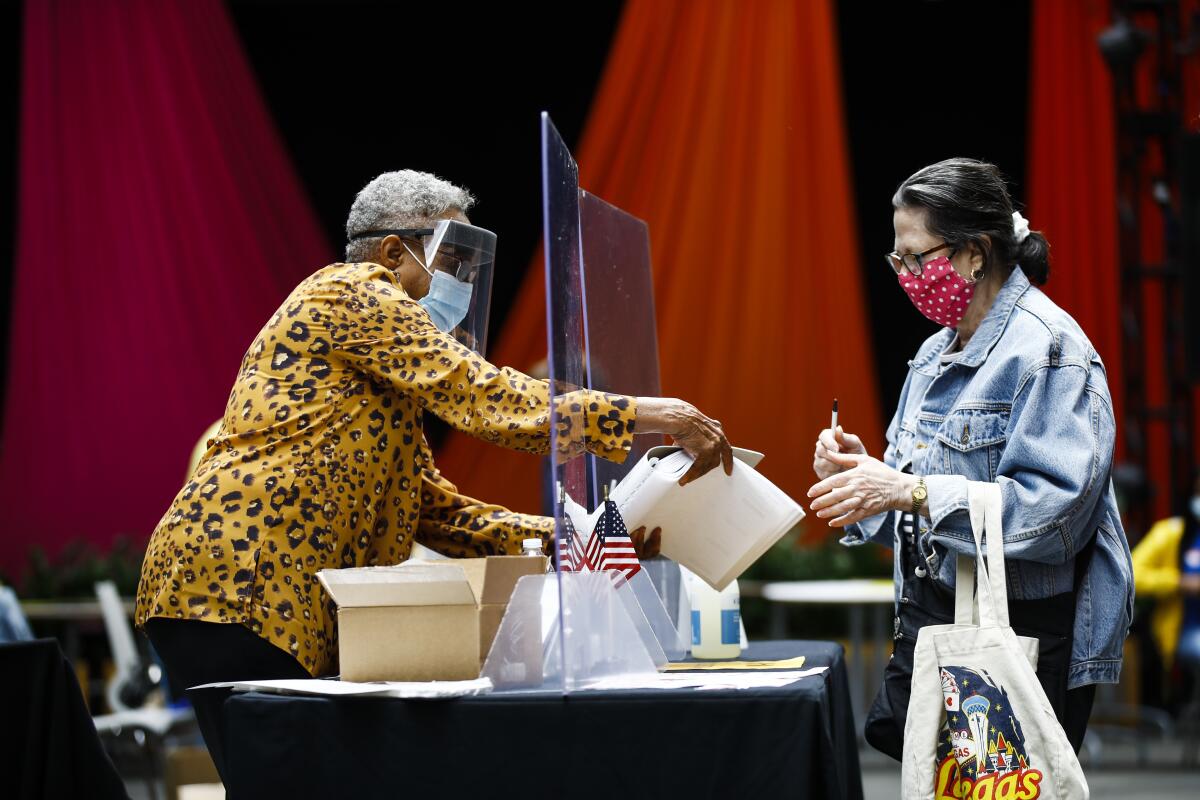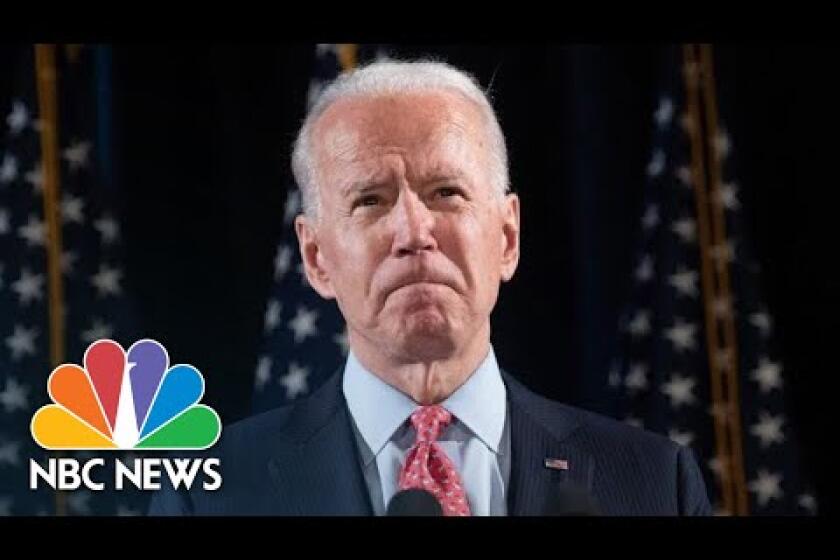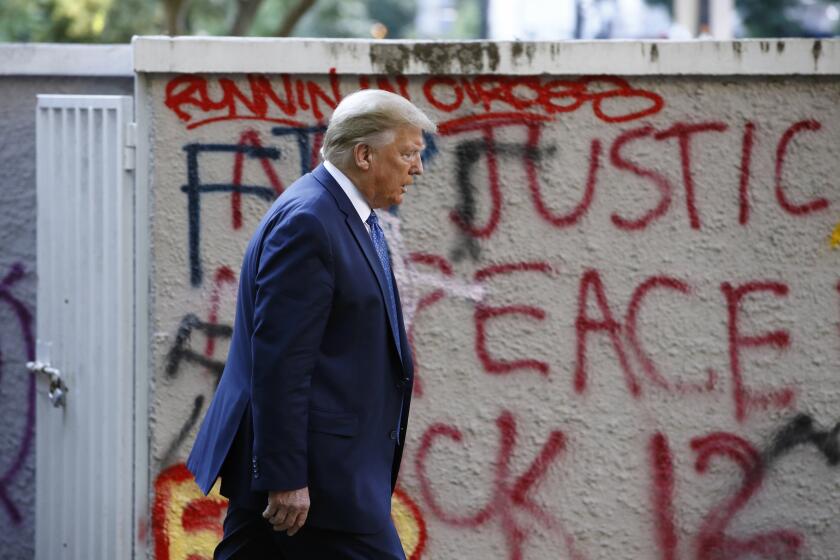Curfews, pandemic and George Floyd protests test voters in primaries held amid unrest

Joe Biden is on the cusp of formally securing the Democratic presidential nomination after winning hundreds more delegates in primary contests Tuesday that tested the nation’s ability to run elections while balancing a pandemic and sweeping social unrest.
Biden could lock down the nomination within the next week as West Virginia and Georgia hold primaries.
On Tuesday, voters across America were forced to navigate curfews, health concerns and National Guard troops — waiting in line hours after polls closed in some cases — after election officials dramatically reduced the number of in-person voting sites to minimize the spread of the coronavirus outbreak.
Biden and President Trump easily swept their respective primary contests that ranged from Maryland to Montana and featured the night’s biggest prize: Pennsylvania. The two men are certain to face each other on the presidential ballot in November, yet party rules require them first to accumulate a majority of delegates in the state-by-state primary season.
Trump secured the Republican nomination in March.
Pennsylvania offered the day’s biggest trove of delegates, and it also represented a significant test case for Republicans and Democrats working to strengthen their operations in a premier general election battleground.
Voters were forced to brave long lines in “militarized zones” because officials consolidated the vast majority of polling places in Philadelphia to minimize health risks, according to Erin Kramer, executive director of One Pennsylvania. She noted that some polling places in African American communities are in police stations.
“Having to stand in line while police officers are entering and exiting the building on police business is not exactly how people want to spend their election day,” Kramer said.
Biden likens Trump to violent segregationists in response to George Floyd protests, decries gassing of demonstrators for a church ‘photo-op.’
Biden was on the primary ballot in almost every state in his bid to unify Democrats behind his campaign against Trump. The former vice president is already the presumptive Democratic presidential nominee, given that all his rivals have dropped out of the race, but he needs to win 89% of all delegates at stake on Tuesday to formally clinch the nomination.
If he doesn’t secure the needed delegates Tuesday, he has other opportunities to do so this month.
Biden was in Philadelphia on Tuesday morning to deliver remarks about the civil unrest that has erupted across the nation. He didn’t talk about the primary, instead focusing his attention on Trump, whom he blasted as “more interested in power than in principle.”
Sen. Bernie Sanders is not actively campaigning, having suspended his operation and endorsed Biden, but his name appeared on ballots. On the eve of Tuesday’s primaries, senior advisor Jeff Weaver encouraged progressives to vote for Sanders anyway.
“People who support Bernie Sanders and his agenda, who want to maximize the influence of progressives at the convention, should cast their vote for Bernie Sanders,” Weaver said, reminding voters that the Vermont senator is seeking leverage to shape the party’s platform and rules.
The comments serve as a reminder that Biden may have no legitimate Democratic rivals remaining but must still win over skeptical activists from his party’s left flank who worry he’s too close to the political establishment.
Trump’s ‘law and order’ campaign echoes Richard Nixon’s in 1968. But Nixon was the challenger.
Party unity will probably be an afterthought this week, however, as more immediate health and safety concerns dominate the national conversation. The coronavirus death toll has surged past 106,000 nationwide, and thousands of new cases are reported each day.
At the same time, several major cities, including some voting Tuesday, are grappling with protests.
Some voters said Trump’s increasingly authoritarian tone toward protesters inspired them to participate in the democratic process. Nicholas Autiello, who works in finance in Rhode Island, said he was disturbed by police driving back peaceful demonstrators near the White House on Monday.
“Last night, we have a president who is acting like a dictator,” Autiello said. “So being able to come out here this morning and fill in a circle next to a name for someone who I know will restore honor and decency to the presidency was so important.”
Political groups have had to adjust as some states move to a system that relies largely on voting by mail. They include Montana, where all 56 counties voted entirely by mail. Voting rights watchdogs in multiple states have expressed concerns about access to mail ballots, confusion about deadlines and a shortage of poll workers that could lead to long lines.
Those voting Tuesday include the District of Columbia, Indiana, Maryland, Montana, New Mexico, Pennsylvania, Rhode Island and South Dakota. Two other states holding primary elections, Idaho and Iowa, chose its presidential nominee early in the year and is now focused on other offices.
“We are in unique times, and voting is a unique challenge for people,” said Josh Schwerin, chief strategist for the pro-Democratic super PAC Priorities USA. He said that his organization and others will be watching closely Tuesday “to see how well it works, where issues are and where obstacles have been put in place.”
Republicans in northwest Iowa ousted Rep. Steve King in Tuesday’s primary, deciding they’ve had enough of the conservative lightning rod known for making incendiary comments about immigrants and white supremacy throughout his nearly two decades in Congress.
The nine-term congressman, shunned by his party leadership in Washington and many of his longtime supporters at home, lost to well-funded state Sen. Randy Feenstra in a five-way GOP primary. The challengers argued that King’s loss of clout, even more than the continuous string of provocative and racially charged statements over his career, was reason enough for turning on him.
Iowa Democrats also chose a Senate challenger for Republican freshman Sen. Joni Ernst in a race earlier thought to heavily favor Ernst until her approval shrank over the past year. Des Moines businesswoman Theresa Greenfield, who raised the most money and garnered the widest cross-section of the Iowa Democratic coalition of elected officials and labor unions, won the nomination over three others.
More to Read
Get the L.A. Times Politics newsletter
Deeply reported insights into legislation, politics and policy from Sacramento, Washington and beyond. In your inbox three times per week.
You may occasionally receive promotional content from the Los Angeles Times.












